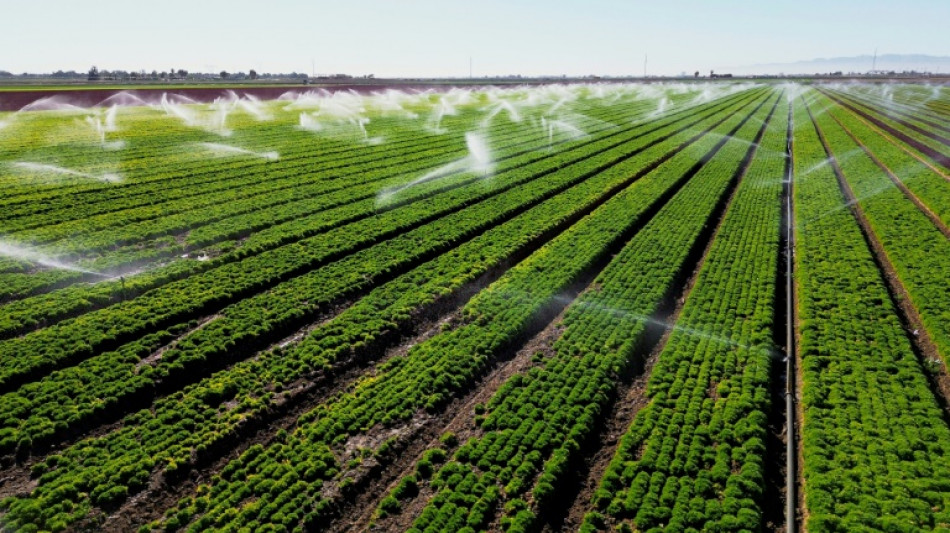
-
 Konstas and Khawaja put Australia on top in 4th Test against India
Konstas and Khawaja put Australia on top in 4th Test against India
-
Lakers pip Warriors after another LeBron-Curry classic

-
 India readies for 400 million pilgrims at mammoth festival
India readies for 400 million pilgrims at mammoth festival
-
Nepal hosts hot air balloon festival

-
 Asia stocks up as 'Santa Rally' persists
Asia stocks up as 'Santa Rally' persists
-
Tears, prayers as Asia mourns tsunami dead 20 years on

-
 Sydney-Hobart yacht crews set off on gale-threatened race
Sydney-Hobart yacht crews set off on gale-threatened race
-
Key public service makes quiet return in Gaza

-
 Fearless Konstas slams 60 as Australia take upper hand against India
Fearless Konstas slams 60 as Australia take upper hand against India
-
Bridges outduels Wembanyama, Celtics lose again

-
 Hungry Sabalenka ready for more Slam success
Hungry Sabalenka ready for more Slam success
-
Mass jailbreak in Mozambique amid post-election unrest

-
 Azerbaijani jet crashes in Kazakhstan, killing 38
Azerbaijani jet crashes in Kazakhstan, killing 38
-
Bridges outduels Wembanyama as Knicks beat Spurs

-
 2004 Indian Ocean tsunami: what to know 20 years on
2004 Indian Ocean tsunami: what to know 20 years on
-
Asia to mourn tsunami dead with ceremonies 20 years on

-
 Syrians protest after video of attack on Alawite shrine
Syrians protest after video of attack on Alawite shrine
-
Russian state owner says cargo ship blast was 'terrorist attack'

-
 38 dead as Azerbaijani jet crashes in Kazakhstan
38 dead as Azerbaijani jet crashes in Kazakhstan
-
Crisis-hit Valencia hire West Brom's Corberan as new boss

-
 Suriname ex-dictator and fugitive Desi Bouterse dead at 79
Suriname ex-dictator and fugitive Desi Bouterse dead at 79
-
35 feared dead as Azerbaijani jet crashes in Kazakhstan

-
 Pope calls for 'arms to be silenced' in Christmas appeal
Pope calls for 'arms to be silenced' in Christmas appeal
-
Syria authorities say torched 1 million captagon pills

-
 Pope calls for 'arms to be silenced' across world
Pope calls for 'arms to be silenced' across world
-
32 survivors as Azerbaijani jet crashes in Kazakhstan

-
 Pakistan air strikes kill 46 in Afghanistan, Kabul says
Pakistan air strikes kill 46 in Afghanistan, Kabul says
-
Liverpool host Foxes, Arsenal prepare for life without Saka

-
 Japan FM raises 'serious concerns' over China military buildup
Japan FM raises 'serious concerns' over China military buildup
-
Pope's sombre message in Christmas under shadow of war

-
 Zelensky condemns Russian 'inhumane' Christmas attack on energy grid
Zelensky condemns Russian 'inhumane' Christmas attack on energy grid
-
Sweeping Vietnam internet law comes into force

-
 Pope kicks off Christmas under shadow of war
Pope kicks off Christmas under shadow of war
-
Catholics hold muted Christmas mass in Indonesia's Sharia stronghold

-
 Japan's top diplomat in China to address 'challenges'
Japan's top diplomat in China to address 'challenges'
-
Thousands attend Christmas charity dinner in Buenos Aires

-
 Demand for Japanese content booms post 'Shogun'
Demand for Japanese content booms post 'Shogun'
-
As India's Bollywood shifts, stars and snappers click

-
 Mystery drones won't interfere with Santa's work: US tracker
Mystery drones won't interfere with Santa's work: US tracker
-
Djokovic eyes more Slam glory as Swiatek returns under doping cloud

-
 Australia's in-form Head confirmed fit for Boxing Day Test
Australia's in-form Head confirmed fit for Boxing Day Test
-
Brazilian midfielder Oscar returns to Sao Paulo

-
 'Wemby' and 'Ant-Man' to make NBA Christmas debuts
'Wemby' and 'Ant-Man' to make NBA Christmas debuts
-
US agency focused on foreign disinformation shuts down

-
 On Christmas Eve, Pope Francis launches holy Jubilee year
On Christmas Eve, Pope Francis launches holy Jubilee year
-
'Like a dream': AFP photographer's return to Syria

-
 Chiefs seek top seed in holiday test for playoff-bound NFL teams
Chiefs seek top seed in holiday test for playoff-bound NFL teams
-
Panamanians protest 'public enemy' Trump's canal threat

-
 Cyclone death toll in Mayotte rises to 39
Cyclone death toll in Mayotte rises to 39
-
Ecuador vice president says Noboa seeking her 'banishment'


California's desert farmers defend their river rights
A blanket of crops covers the floor of the Imperial Valley in southern California, a patchwork of vibrant greens given life by the Colorado River in a landscape bleached by the desert sun.
But as a decades-long drought desiccates the US West and the once-mighty river dwindles, questions are being asked about why a handful of farmers are allowed to take as much water as all of Nevada and Arizona combined.
"We average less than two inches (five centimeters) of rainfall per year," fourth generation farmer Andrew Leimgruber told AFP.
"So without the supply of Colorado River water coming here, there would be no one living here, there'd be nothing being grown here, this would be a desert."
The valley, along with Yuma in Arizona, is a vital part of America's huge agricultural sector, producing most of the vegetables the United States eats over winter, in a business that generates around $2 billion a year.
Farmers here also grow alfalfa, a forage crop supplied to beef and dairy ranchers.
- Ancient agreement -
The land here has always been fertile, but it's always been dry.
The pioneers who forged the West realized that with its permanent sunshine, Imperial Valley could produce crops year-round to feed a growing population, as long as they could keep the fields watered.
Their solution was to build an 80-mile (130-kilometer) canal from the Colorado River, positioning themselves at the head of the queue for the rights to that river.
An agreement hashed out over a century ago allows Imperial Valley farmers to use 3.1 million acre-feet of water every year -- about 70 percent of all the water California is allowed to take.
An acre-foot refers to an acre covered in water a foot deep, which equals some 326,000 gallons (1.23 million liters) or about half an Olympic-size swimming pool.
But as human-caused climate change worsens a drought that has now lasted more than two decades, the river is struggling to keep up with demand.
The 40 million people in the West who rely on it, including in some of America's biggest cities, are being told they need to cut back.
Residents of Los Angeles last year faced fines for watering their gardens too often, and are urged to take only short showers instead of baths.
The predicament has pitted suburban homeowners surveying their brown lawns against nearby farmers.
"As the largest water user on the river, we become a target because it becomes an easy solution," says Tina Shields of the Imperial County Irrigation District.
"We're not going to sacrifice our community for urban sprawl and urban development and other areas."
In any case, says Shields, many of the people who complain about farmers using water are happy to fill their refrigerators with the food they produce.
"We grow a half million acres a year of crops that feed our nation and other nations as well. So it's critical to our community and our economy in particular."
- 'No lack of work' -
Despite its water wealth, Imperial County is one of the poorest in California and would struggle to survive without agriculture.
Rural workers, mostly Latinos, come from a wide area, including across the Mexican border several dozen miles away, to earn money in the fields.
"There has been no lack of work here," says Ramon Cardenas, who has toiled for three decades under summer temperatures that regularly top 100 degrees Fahrenheit (38 degrees Celsius).
Some farmers have cut deals with power generation companies, signing long-term leases that see crops replaced by solar panels.
They might not be using water anymore, but neither are they offering work.
Cardenas hopes the trend won't spread.
"We depend on this," he says gesturing to the crew picking lettuce.
- Productive land -
Despite a very wet California winter, Imperial Valley hasn't gotten much rain this year.
As Leimgruber's sprinklers spray hundreds of liters (gallons) of water onto a field, he insists it is well used.
Even thirsty alfalfa -- around 15 percent of which he says is exported -- is vital for a country that consumes so much meat and dairy, he says.
"California is the top dairy-producing state in the country, and that's because of the Imperial Valley's ability to plant alfalfa," he says.
"A lot of Americans don't think it's possible to see empty shelves, and it's areas like this that ensure the country is fed and I think that has to be protected."
And, he insists, if Imperial Valley didn't produce the alfalfa, other suppliers would simply step in and fill the void.
Why, he questions, should he and his fellow farmers miss out on that?
"People don't understand how productive this land is," he says.
O.M.Souza--AMWN



